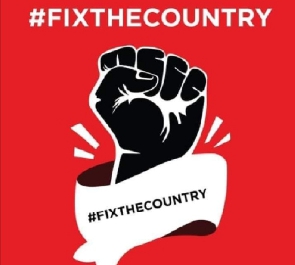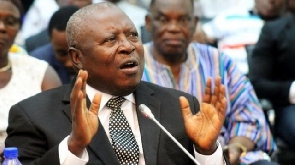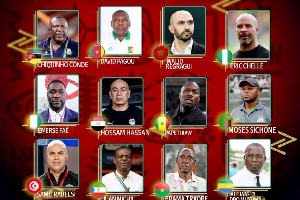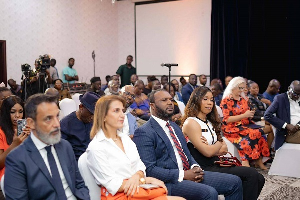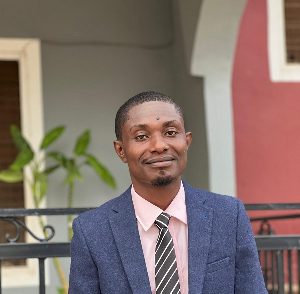It is a common fact and saying that “fixing is far more difficult than destroying”, and it is in this light that I share my views on the “#fixthecountry” campaign, and the approach for a national reconstruction.
Such an approach must relate to the socio-political and economic context because context is an essential element in communicating and constructing meaning and its interpretation.
Ghana’s Political History
The political history of Ghana has been a tortuous one. The 64 years of its life present to me a picture revealing a top-down, macro governance which so far has not proved successful?
Both the republics and the military regimes have over the years raised the national aspirations so high (be they manifestos and promises in political party campaigns or reasons for military interventions) that citizen’s sound frustrated because of the unfulfilled aspirations.
This political culture has eventually produced a macro-consciousness in citizens in relation to their expectations of government.
Thus, most Ghanaians are seemingly fixated on the macro-consciousness holding that the central government is capable of solving all problems and responsible for providing jobs, abundance and prosperity.
This expectation can overwhelm governments. Yet, it is the doing of the various regimes despite their numerous challenges.
Their reliance on top-down approach for building the nation since independence has soured the populace by unfulfilled government promises.
Military Takeovers
The military takeovers that disrupted the first, second and third republics attributed their cause to “revolution of rising frustration” or public discontent.
Altogether national aspirations have outrun attainments; the different republics have not achieved the desired change and the military regimes, and indeed the Rawlings’ revolution, could not change us as a nation.
There is definitely something missing.
Economic Management
Apart from the political factor, Ghanaians have thought economic mismanagement ruined the country’s progress.
Yet, this argument comes after application of several economic models. The country’s economic foibles were recently said to be due to weak economic fundamentals.
While Ghanaians were looking forward to its fixing, COVID-19 entered the world stage to afflict nations. Amidst this pandemic, a call to “fix the country” expresses the high expectations that have not been met.
Fixing the economic fundamentals is relevant, particularly at the macro level. However, it may not achieve the desired success unless the sociological, attitudinal fundamentals are mended. It is like a car battery and its accompanying alternator.
If the alternator is faulty, the battery runs down persistently until a step is taken to replace or fix the alternator. Daniel Lerner, a sociologist, called this element needed for transformation as change of “lifeways” in the behavioural system.
Attitudinal Change
Now, the alternative path to progress in our context lies in bottom-up attitudinal change.
The 64 years of self-government have not yielded the results we sought because the attitudinal fundamentals are weak.
The political and economic experimentations present a back and forth course of development, running a full circle.
Once the politicians and military officers thought the solution was political change, the dream evaded Ghanaians.
Despite the contributions of the various governments to Ghana’s development, they have also made some misjudgments along the line.
In fact, politically and economically sound government is important for the nation’s progress. However, the political and economic contributions have not gained us the aspirations yet because of a missing link.
This missing link is the neglected social factor as the bottom-line to effect increasing political and economic transformation.
The weak attitudinal fundamentals will always undermine progressive efforts by a government. Thus, the alternative path in our context lies in bottom-up attitudinal change.
Whereas attitudes involve values and mindset, they manifest in judgments about things and have effect on behaviours or overt actions.
As a result, good or bad attitudes as individuals are carried on to the national arena. So, the thesis of this discourse is that a bottom-up approach will make individual citizens, or subsystems (decentralized systems) in the society feel responsible to reforming or fixing their attitudes for better Ghana.
Transformation
The transformation must be self-directed. It takes the citizen agency pattern because units form the aggregate; individual citizens make the community or nation.
Certainly, individuals are selected to govern and oversee the government machinery.
The president is an individual, a citizen, so also are the ministers, parliamentarians, judges, chiefs, elders, clergy, leaders of organizations or institutions, and indeed ordinary citizens. Once they were all simply individual citizens.
What one is as an individual and how one is formed as an individual in the community would shape one’s service.
If that is not the case, why do we bother ourselves with training? What would be the purpose of background checks and so on before giving certain positions to people?
Simply put, this traditional Ghanaian philosophy of developing the individual to find his or her authentic place in society has almost eroded.
In its place, one may find in the population growing false sense of being, false conception of success, false sense of freedom and rights, misplaced choices, and so on.
Some of us resist calls to change certain attitudes here in Ghana; but the very moment we are in the Western environment we drop them.
Is it an attitude that I won’t offer my country the best of me? In Ghana, when I don’t get my way with the system, I resort to threats like “I won’t vote for you”; and the weak political machine will feel disarmed.
Also, with the least opportunity at wherever my station, I want to cheat the system. That was the attitude of some in the colonial period when one felt justified taking something home because the colonial master was taking away our resources.
It should not be the case today when I am part of the self-government.
This attitude is part of the mental slavery to cite Bob Marley; I need to decolonise my mind. After weakening the system with my poor attitudes, I unconscionably project my frustration onto the central government.
I easily copy some Western attitudes, but hardly do I consider good ones like work ethics, time management, patriotism and national interest.
Way forward
Let us, as individuals, fix our attitudes and reform ourselves into a renewed consciousness that buys in good citizenship, Ghana first, feeling authentic ownership of Ghana’s success and destiny, feeling obligated to contribute to the implementation of laws and policies, protecting more the national interest than our own at all times.
This way, the government as a macro-system will be fixed naturally – I fix myself, you fix yourself, we are fixed and Ghana is fixed, and this is the urgent strategy to better Ghana from now.
But the problem is that I want to blame the macro-system (government), meanwhile I am afraid to work on myself because I want to escape introspection and take the easy route.
When I say that the challenge is not about me but the other, I am not being honest to myself; it is a projection onto the other, which is the government.
Don’t get me wrong; I am not saying the leadership is excused. We are all not excused.
Conclusion
To end, I would say that I like the organizing ability of the conveners or campaigners of the “#fixthecountry” campaign.
The ‘hashtag’ is catchy, however, our context needs modifying the focus for now.
The alternative path of targeting the individual and subsystems in a bottom-up approach can bring the difference in our national progress.
Let the organizers and sponsors of the “#fixthecountry”, relevant public and private institutions use digital platforms to communicate the campaign for transformation to fix ourselves as citizens for rebuilding Ghana.
Therefore, this alternative path is a mobilization for social change in the sense of changing attitudes or mindset, the aggregation of which will fix the country.
If we would include a religious dimension, the government may declare a National Day of Prayer and fasting for social change in which we renounce our unhealthy ways.
It is a general call to all of us (from the ordinary person to the leadership) to affirm our individual responsibility and resolve to name and shame anyone, low or high in status, who will want for his or her own interests and selfish gains to sub-optimize the system.
Law enforcers must also apply the law faithfully and equitably; and to the justice system to sanction without fear or favour.
At the end, let us unalloyed profess a new vision and orientation, and introduce civic education based on our refined culture, values, and aspiration.
Opinions of Tuesday, 1 June 2021
Columnist: Dennis Peprah

